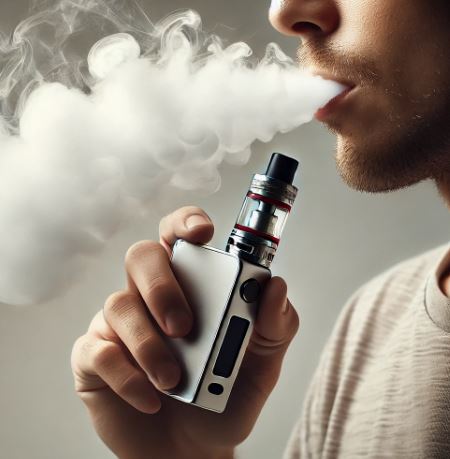What Dental Problems Can Vaping Cause?
While vaping is perceived by some as a “safer” alternative to traditional cigarettes, it can have negative effects on oral health. Below, I explain the main dental problems that can arise from using electronic cigarettes or vaping devices:
1. Dry Mouth (Xerostomia)
Vaping contains propylene glycol, a substance that absorbs moisture from the mouth, which can lead to dry mouth. Saliva is crucial for oral health because it helps clean the mouth, neutralize acids, and prevent plaque buildup. Xerostomia increases the risk of cavities, infections, and bad breath.
2. Tooth Decay
The reduction of saliva caused by vaping increases the risk of tooth decay. Additionally, some vaping liquids contain sweeteners and flavors that can increase plaque formation and promote the development of cavities, especially if good oral hygiene practices are not followed.
3. Gum Irritation and Inflammation
The chemicals present in vaping liquids can irritate the gum tissue, leading to gum inflammation (gingivitis). Over time, untreated gingivitis can progress to periodontitis, a more serious disease that affects the gums and bones that support the teeth.
4. Increased Risk of Periodontal Disease
Vaping can alter the bacterial balance in the mouth, promoting the growth of harmful bacteria that contribute to periodontal disease. Periodontitis is a serious condition that can lead to tooth loss if left untreated.
5. Gum Recession
Continued irritation from vaping can contribute to gum recession. When gums recede, they expose the roots of the teeth, which can cause dental sensitivity, increase the risk of root cavities, and affect dental aesthetics.
6. Teeth Staining
Although electronic cigarettes do not contain tar, some vaping liquids can contain substances that stain teeth, especially those with flavors or colorants. Over time, this can lead to tooth enamel darkening.
7. Oral Injuries
Overheating or explosions of vaping devices can cause burns or injuries to the lips, tongue, and gums, though this is less common.
8. Impaired Wound Healing
Like smoking traditional cigarettes, vaping can affect the body’s ability to heal oral tissues. This can be problematic, especially after dental procedures such as extractions or surgeries, where proper healing is crucial for recovery.
9. Increased Risk of Oral Cancer
Although vaping generally contains fewer carcinogens than traditional cigarettes, it still exposes the mouth to harmful chemicals. Aldehydes and other carcinogenic compounds have been found in some vaping liquids, which could increase the risk of developing oral cancer in the long term.
10. Dental Sensitivity
Changes in saliva and continuous exposure to chemicals can make teeth more sensitive, especially to cold or hot foods.
Conclusion:
Although vaping may be less harmful than smoking traditional cigarettes, it is not harmless to oral health. Vaping can cause dry mouth, cavities, gum disease, teeth staining, and an increased risk of other dental issues. Maintaining rigorous oral hygiene, visiting the dentist regularly, and reducing or avoiding vaping are key steps to preventing these problems.

